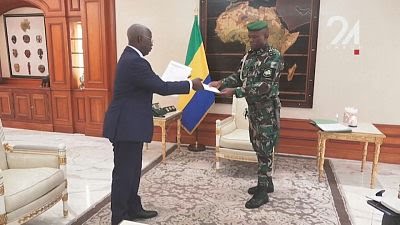Gabon’s strongman General Brice Oligui Nguema has hosted the country’s newly appointed interim prime minister, Raymond Ndong Sima, at the Presidential Palace in Libreville and tasked him with proposing a government lineup.
Speaking to AFP shortly after his appointment was announced, Ndong Sima said he would submit a proposed government lineup to Oligui “in three or four days.”
“They’ve given me a roadmap, and I will try to work in the direction that the military have determined… for restoring all our institutions, and especially everything concerning the framework for elections,” he said by phone.
Ndong Sima said he wanted to take time for “broad consultations… so that people belonging to all political families are included” in the government.
His appointment, announced on state TV, was made in a decree by the new strongman, General Brice Oligui Nguema, who was sworn in as interim president on Monday.
In his inauguration speech, Oligui vowed to hold “free, transparent and credible elections” to restore civilian rule, but did not give a timeframe.
He also said he would soon announce a transitional government that drew on figures from across the political spectrum.
The country would also draw up a new constitution, drafted with representatives from all the key groups, which would be “more respectful of democracy and human rights” and submitted to a referendum, Oligui said.
Ndong Sima, a 68-year-old Paris-educated economist, served as prime minister under Bongo from 2012 to 2014 before becoming a critic and competing against him in the 2016 and 2023 presidential campaigns.
Bongo, 64, took office in 2009 on the death of his father Omar, who ruled the central African state with an iron fist for more than 40 years, gaining a reputation as a kleptocrat.
He was re-elected by a wafer-thin margin in 2016, according to bitterly disputed official results, but two years later suffered a stroke that weakened his grip on power.
On August 30, soldiers led by Oligui, head of the elite Republican Guard, detained Bongo, his wife and son shortly after election overseers declared him victor in a presidential ballot four days earlier.
Ndong Sima had campaigned against Bongo but just before election day stood back to rally behind a joint opposition candidate, university academic Albert Ondo Ossa.
Ondo Ossa was credited with 30.77 percent of the vote against Bongo’s 64.27 percent — a result the opposition lashed as bogus.
Earlier this week, Ndong-Sima told AFP that it was necessary to “speak with the military” after the takeover.
He said that the transition back to civilian rule should not exceed two years and that he would be “interested” in taking part in the next presidential elections, which should not include candidates from the military.








